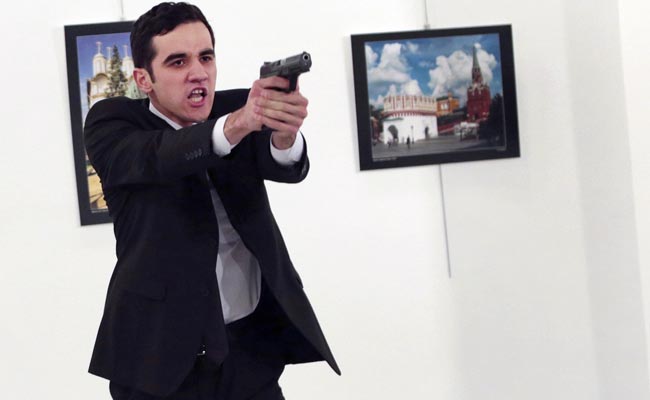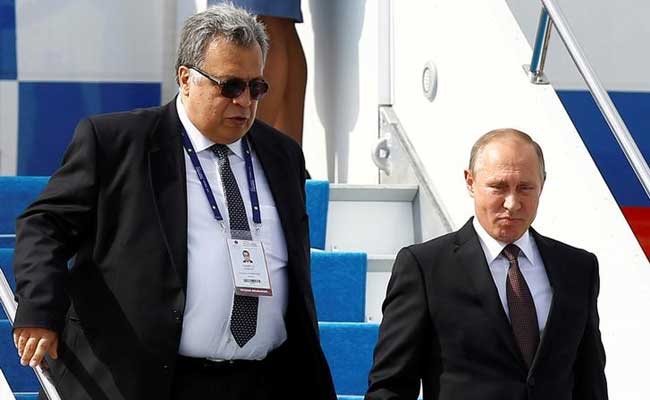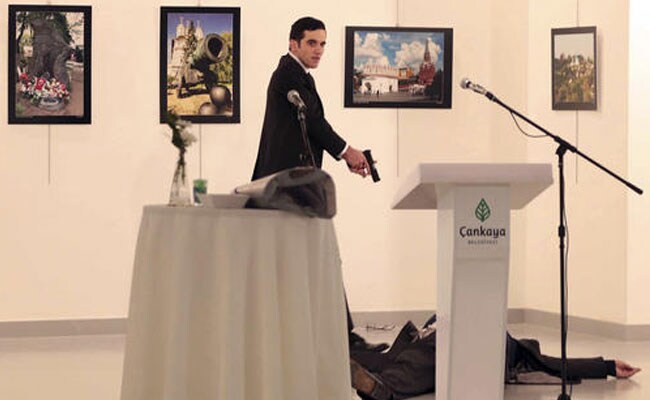Russian ambassador to Turkey, Andrei Karlov, was shot dead in a gun attack in Ankara. (AFP)
Moscow:
A Turkish police officer who angrily denounced the bloodshed in Syria killed the Russian ambassador to Turkey in Ankara on Monday, shooting the diplomat in front of a room full of horrified spectators at an art gallery in an assassination captured on video and quickly shared around the world.
As the ambassador, Andrei Karlov, lay on the floor, the assailant, still waving his gun, screamed, "Don't forget Aleppo! Don't forget Syria!"
The shooting was among the most brazen retaliatory attacks yet on Russia since Moscow entered the war in Syria on the side of President Bashar al-Assad, and unleashed a bombardment on Aleppo that has drawn international condemnation for what observers on the ground have called indiscriminate attacks on civilians.
But in Moscow, where the Kremlin has maintained that its aerial sorties and missile attacks have exclusively targeted "terrorists," Russia's Foreign Ministry called the shooting "a terrorist attack," and President Vladimir Putin called it a "provocation aimed at rupturing ties between Russia and Turkey."
"The only answer to the murder of the Russian ambassador to Turkey must be the intensification of the struggle against terrorism," Putin said in nationally televised remarks. "And the bandits will feel it."
 Putin ordered his major crime investigative unit to work with Turkish authorities, who identified the gunman as 22-year-old Mevlut Mert Altintas, an officer with the riot police. In the video, Altintas, dressed incongruously in a black suit and tie, shouts, "We are those who pledged jihad to Muhammad!" Referring to Syria, he added, "Every single person who has a share in this atrocity will pay for it!"
Putin ordered his major crime investigative unit to work with Turkish authorities, who identified the gunman as 22-year-old Mevlut Mert Altintas, an officer with the riot police. In the video, Altintas, dressed incongruously in a black suit and tie, shouts, "We are those who pledged jihad to Muhammad!" Referring to Syria, he added, "Every single person who has a share in this atrocity will pay for it!"
Several other people were wounded in the attack, which came as Karlov was speaking at the opening of an exhibit of Russian photos, but their identities were not immediately made public.
Altintas was killed in a shootout with police at the gallery, but Russian authorities vowed to reveal a larger plot - and some in Moscow suggested that the West was to blame for its support of moderate rebel factions in Syria.
Putin stopped short of that, saying only, "We need to know who guided the hand of the murderer."
The assassination was Turkey's third major attack in less than 10 days, and followed months of deadly violence - including a failed coup attempt and a suicide attack on Istanbul's international airport - that has highlighted the threats facing the government of President Recep Tayyip Erdogan and left the country reeling from a sense of siege.
 The attacks have reflected a convergence of crises that Turkey, a NATO member and major ally of the United States, has weathered over the past few years. They include the spillover from the war in neighboring Syria, a failed peace deal with Kurdish militants and a domestic challenge from a shadowy network tied to a Turkish preacher living in the United States.
The attacks have reflected a convergence of crises that Turkey, a NATO member and major ally of the United States, has weathered over the past few years. They include the spillover from the war in neighboring Syria, a failed peace deal with Kurdish militants and a domestic challenge from a shadowy network tied to a Turkish preacher living in the United States.
Erdogan has successfully seized on the crises to consolidate his authority. His government has moved forcefully against Kurdish and Islamist militants as well as followers of the preacher, Fethullah Gulen.
It was not clear whether Altintas, the assassin, fit into any of those categories. The interior minister said Altintas hailed from a town near Izmir, on the Aegean coast, and had been on the force for 2 1/ 2 years. Some pro-government commentators tried to brand him as a follower of Gulen, while his shouted manifesto after the shooting suggested, at the very least, that he was acting out of anger at the carnage in Syria.
In a television address hours after the shooting, Erdogan also condemned the assassination as "a provocation" aimed at disrupting warming ties between Turkey and Russia. Erdogan, who has been a leading regional opponent of the Syrian government, also defended Turkey's cooperation with Syria's sponsor, Russia, saying that it aimed to "find a solution for the humanitarian crisis in Syria" and "stop the oppression in Aleppo."
Erdogan and Putin, two strongmen with global aspirations, have found common ground in recent months in their desire to secure an end to the Syrian war that would guarantee their long-term influence at a time when U.S. diplomacy has collapsed.
Their foreign ministers, as well as their counterpart from Iran, which backs Assad, are planning to meet Tuesday in Moscow to negotiate a settlement to the Syrian war that would exclude the United States and assert the three powers as the region's most vital players.
The newfound cooperation between Russia and Turkey over Syria was exemplified by the deal they brokered last week for the evacuation of besieged people from the last few blocks of rebel-held territory in eastern Aleppo.
 The statements by Putin and Erdogan suggested that the assassination may not disrupt their budding convergence of interests. Until last summer, the two presidents had been bitter rivals over Syria, supporting opposite sides in the war and embroiled in recriminations over the shoot-down by Turkey of a Russian fighter jet in November 2015.
The statements by Putin and Erdogan suggested that the assassination may not disrupt their budding convergence of interests. Until last summer, the two presidents had been bitter rivals over Syria, supporting opposite sides in the war and embroiled in recriminations over the shoot-down by Turkey of a Russian fighter jet in November 2015.
Those circumstances have led some Russian politicians to accuse the West of complicity in the attack.
"They are afraid of that alliance. It's a counterweight to the European Union and NATO," said Vladimir Zhirinovsky, a nationalist politician whose often outlandish remarks on foreign policy are sometimes seen as a trial balloon for things the Kremlin would rather not say.
Many players risk losing out in any Russian-Turkish deal over the future of Syria, including the U.S.-backed Syrian opposition, extremists with the Islamic State, and Syria's al-Qaida affiliate.
The United States, meanwhile, joined other nations in condemning the shooting. "Our thoughts and prayers are with his loved ones, the Russian people, and with the other victims who were injured in this shooting," Secretary of State John Kerry said in a statement. "We stand ready to offer assistance to Russia and Turkey as they investigate this despicable attack, which was also an assault on the right of all diplomats to safely and securely advance and represent their nations around the world."
"Our thoughts and prayers are with his loved ones, the Russian people, and with the other victims who were injured in this shooting," Secretary of State John Kerry said in a statement. "We stand ready to offer assistance to Russia and Turkey as they investigate this despicable attack, which was also an assault on the right of all diplomats to safely and securely advance and represent their nations around the world."
President-elect Donald Trump also issued a statement condemning the killing.
Karlov started his diplomatic career in 1976 during the Soviet era and took the post in Ankara in July 2013, according to the embassy's website. Putin referred to him as a "brilliant diplomat" who "had excellent relations with the leadership of Turkey and other political forces."
The incident could spur even more vigorous efforts between Russia and Turkey to secure their role as Syria's main power brokers and negotiate a settlement to the war on their terms. Aaron Stein, a resident senior fellow at the Atlantic Council's Rafik Hariri Center for the Middle East, said that any fallout "will entirely depend on Russia's reaction."
"All indications thus far is that they will retain the relations they have built with Turkey since the rapprochement a couple of months ago," he added. The recent cease-fire cobbled together was to Russia's long-term benefit in Syria, while also addressing Turkey's real concern about civilian casualties, Stein said.
(Fahim reported from Cairo, Sly from Beirut. Brian Murphy and Karen DeYoung in Washington, Zeynep Karatas in Istanbul and Erin Cunningham in Irbil, Iraq, contributed to this report.)
As the ambassador, Andrei Karlov, lay on the floor, the assailant, still waving his gun, screamed, "Don't forget Aleppo! Don't forget Syria!"
The shooting was among the most brazen retaliatory attacks yet on Russia since Moscow entered the war in Syria on the side of President Bashar al-Assad, and unleashed a bombardment on Aleppo that has drawn international condemnation for what observers on the ground have called indiscriminate attacks on civilians.
But in Moscow, where the Kremlin has maintained that its aerial sorties and missile attacks have exclusively targeted "terrorists," Russia's Foreign Ministry called the shooting "a terrorist attack," and President Vladimir Putin called it a "provocation aimed at rupturing ties between Russia and Turkey."
"The only answer to the murder of the Russian ambassador to Turkey must be the intensification of the struggle against terrorism," Putin said in nationally televised remarks. "And the bandits will feel it."

The gunman shot the Russian Ambassador to Turkey, Andrei Karlov, at a photo gallery in Ankara. (AP)
Several other people were wounded in the attack, which came as Karlov was speaking at the opening of an exhibit of Russian photos, but their identities were not immediately made public.
Altintas was killed in a shootout with police at the gallery, but Russian authorities vowed to reveal a larger plot - and some in Moscow suggested that the West was to blame for its support of moderate rebel factions in Syria.
Putin stopped short of that, saying only, "We need to know who guided the hand of the murderer."
The assassination was Turkey's third major attack in less than 10 days, and followed months of deadly violence - including a failed coup attempt and a suicide attack on Istanbul's international airport - that has highlighted the threats facing the government of President Recep Tayyip Erdogan and left the country reeling from a sense of siege.

The Russian ambassador to Ankara with Russian President Vladimir Putin. (Reuters)
Erdogan has successfully seized on the crises to consolidate his authority. His government has moved forcefully against Kurdish and Islamist militants as well as followers of the preacher, Fethullah Gulen.
It was not clear whether Altintas, the assassin, fit into any of those categories. The interior minister said Altintas hailed from a town near Izmir, on the Aegean coast, and had been on the force for 2 1/ 2 years. Some pro-government commentators tried to brand him as a follower of Gulen, while his shouted manifesto after the shooting suggested, at the very least, that he was acting out of anger at the carnage in Syria.
In a television address hours after the shooting, Erdogan also condemned the assassination as "a provocation" aimed at disrupting warming ties between Turkey and Russia. Erdogan, who has been a leading regional opponent of the Syrian government, also defended Turkey's cooperation with Syria's sponsor, Russia, saying that it aimed to "find a solution for the humanitarian crisis in Syria" and "stop the oppression in Aleppo."
Erdogan and Putin, two strongmen with global aspirations, have found common ground in recent months in their desire to secure an end to the Syrian war that would guarantee their long-term influence at a time when U.S. diplomacy has collapsed.
Their foreign ministers, as well as their counterpart from Iran, which backs Assad, are planning to meet Tuesday in Moscow to negotiate a settlement to the Syrian war that would exclude the United States and assert the three powers as the region's most vital players.
The newfound cooperation between Russia and Turkey over Syria was exemplified by the deal they brokered last week for the evacuation of besieged people from the last few blocks of rebel-held territory in eastern Aleppo.
Turkish police secure the area where Russian Ambassador Andrei Karlov was shot in Ankara
Those circumstances have led some Russian politicians to accuse the West of complicity in the attack.
"They are afraid of that alliance. It's a counterweight to the European Union and NATO," said Vladimir Zhirinovsky, a nationalist politician whose often outlandish remarks on foreign policy are sometimes seen as a trial balloon for things the Kremlin would rather not say.
Many players risk losing out in any Russian-Turkish deal over the future of Syria, including the U.S.-backed Syrian opposition, extremists with the Islamic State, and Syria's al-Qaida affiliate.
The United States, meanwhile, joined other nations in condemning the shooting.

The man identified as Mevlut Mert Altintas shouted "Allahu Akbar" (God is greatest) and "Don't forget Aleppo".
President-elect Donald Trump also issued a statement condemning the killing.
Karlov started his diplomatic career in 1976 during the Soviet era and took the post in Ankara in July 2013, according to the embassy's website. Putin referred to him as a "brilliant diplomat" who "had excellent relations with the leadership of Turkey and other political forces."
The incident could spur even more vigorous efforts between Russia and Turkey to secure their role as Syria's main power brokers and negotiate a settlement to the war on their terms. Aaron Stein, a resident senior fellow at the Atlantic Council's Rafik Hariri Center for the Middle East, said that any fallout "will entirely depend on Russia's reaction."
"All indications thus far is that they will retain the relations they have built with Turkey since the rapprochement a couple of months ago," he added. The recent cease-fire cobbled together was to Russia's long-term benefit in Syria, while also addressing Turkey's real concern about civilian casualties, Stein said.
(Fahim reported from Cairo, Sly from Beirut. Brian Murphy and Karen DeYoung in Washington, Zeynep Karatas in Istanbul and Erin Cunningham in Irbil, Iraq, contributed to this report.)
Track Latest News Live on NDTV.com and get news updates from India and around the world

